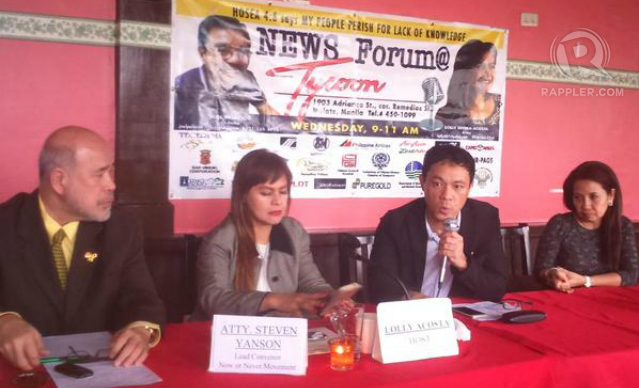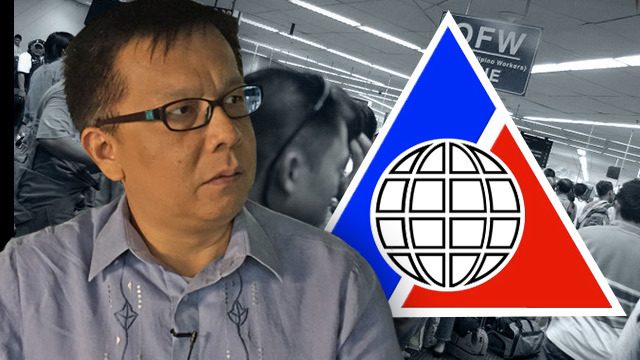SUMMARY
This is AI generated summarization, which may have errors. For context, always refer to the full article.

MANILA, Philippines – A series of what is perceived to be stricter regulatory policies by Philippine Overseas Employment Administration (POEA) Administrator Hans Leo Cacdac divided the recruitment sector, with some saying Cacdac is guilty of abusing his authority and others supporting what they see as needed reforms.
In a press conference Wednesday, July 15, a group of local recruitment agencies deploying household service workers (HSWs) to foreign countries called for Cacdac’s resignation over alleged overreach in “hasty” and “disastrous” suspensions and cancellations of agencies’ licenses. They also implicated Labor Secretary Rosalinda Baldoz.
The newly-formed Now or Never Movement (NNM) alleged that Cacdac violated due process and punished businesses in a substantial number of POEA-cancelled agency licenses in the last 3 years of his leadership. The group is set to stage a nationwide protest on July 20.
But supporters came in defense of the POEA chief’s efforts, stressing the role of recruiters in ensuring overseas Filipino workers (OFWs) are qualified and well-trained.
Other industry leaders said he deserved recognition for his “innovations” protecting HSWs, considered among the most vulnerable OFWs. (READ: DFA: 3 challenges in protecting female domestic workers)
NNM alleged that Cacdac is forcing many Filipinos to take the underground route in applying as OFWs whenever he cancels licenses of agencies.
“In effect, Atty Cacdac is indirectly promoting back doors exit for our countrymen and indirectly helping illegal recruiters,” read NNM’s 4-page statement.
The group’s legal counsel Steven Yanson claims that NNM has 60 recruiter-members in Metro Manila, but most of their member-agencies do not want to be named for fear of government-backed retaliation on their businesses.
While some recruiters condemned Cacdac, a group of both workers’ and recruiters’ organizations went on a “united front” for what they believe are Cacdac’s “reform agenda to bring about ethical recruitment.”
The pro-Cacdac faction is composed of the country’s largest established organizations supporting migrant workers’ rights – all stakeholders in labor migration policy formation.
They are: the Philippine Association of Service Exporters Inc, OFW Family Party-List, Philippine Migrants Rights Watch, Pinoy Expat Bloggers Awards, Patnubay-Riyadh, Philippine Recruitment Agencies Accredited to Saudi Arabia, Filipino Migrant Workers’ Group, and Blas F. Ople Policy Center.
Noisy opposition
The stakeholders regarded NNM as a noisy opposition comprised of “disgruntled recruitment agency owners” unable to keep up with POEA standards.
The Philippines is a known labor-sending country, making ethical recruitment of OFWs a priority for government.
Over 10.5 million Filipinos are either temporarily working or permanently residing abroad, according to a 2013 government compendium. More recent estimates peg the number at 15 million.
Cacdac has repeatedly stressed in the past the need for strict regulation, as not everyone is meant for a life toiling abroad especially as HSWs. (LISTEN: Ethical recruitment of OFWs)
He considers policies in place including standardized employment contracts stipulating floor wages, no-placement fee rule, and mandatory HSW training as non-negotiables. Baldoz has likewise welcomed as good news the recent decrease in deployment of Filipino HSWs, citing these same policies.
Varying reactions
Ethical recruitment advocate Loreto “Lito” Soriano, also an agency owner, said the call for Cacdac’s ouster is “unfair and misplaced” as “most of us in the recruitment industry are able to observe and comply with the rules and regulations of the POEA.”
Advocate Susan Ople of the Blas F. Ople Policy Center lamented NNM’s “disinformation and propaganda,” adding their efforts should instead be diverted to “ethical recruitment procedures and welfare mechanisms for the protection of the workers they deploy.”
But NNM’s Amanda Araneta expressed dismay over what she said were Cacdac’s prejudicial moves against agencies with deficiencies, including announcing these agencies in social media. This unduly hurts business operations of agencies with pending cases, she said.
Araneta, who said she is one of the few willing to come out in the open against abusive POEA policies, heads and manages the MMML Recruitment Services Inc. The agency was recently implicated in the apparent suicide of an HSW.
Based on a POEA-ordered inspection, Cacdac said MMML failed to provide a comprehensive pre-departure briefing to the worker, which he said would be the benchmark for all agencies. He added that MMML was also found to have no labor law compliance certificates in its branches outside Metro Manila, among 9 other “gaps.”

Active monitoring
In an interview with Rappler, the POEA chief explained that local recruiters must be actively monitoring the conditions of the workers they deploy, comprehensively educating them on the realities of employment-related migration, and ensuring they are not only qualified in terms of skill set but also emotionally prepared for their jobs abroad.
These requirements can be met through strict implementation of a structured pre-departure orientation seminar and the non-renewal of licenses of agencies with multiple violations of POEA rules, among others.
Araneta, however, said the government body is expecting an impossibly high standard from recruiters. Her agency couldn’t have foreseen the death of the worker deployed, she said.
Other recruiters and advocates find the bitter word war unnecesary, with Cacdac confirming that Araneta’s grievance can easily be subsumed in her agency’s arguments during the POEA proceedings on the case.
Formal hearings of cases before the POEA take around 6 to 8 months, Cacdac said, denying any violation of agencies’ due process rights.
Still, NNM said suspending or cancelling recruitment agencies’ licenses is uncalled for especially when there has only been a single case of deficiency or violation by the agency.
They said such a punishment would affect other OFW-applicants whose papers can no longer be processed by the agency stripped of its license, despite the other applicants having approved work visas.
Cacdac, however, said over 90% of suspended recruiters have employers who have other local recruitment partners. This means they can still apply for the jobs they desire.
Reforms always meet opposition
Cacdac acknowledged that reforms are always met with opposition.
“People might not understand and appreciate [the reforms] as hard as we do, [but] it’s our duty to send a clear message,” he said in a phone interview.
In defending POEA’s regulatory policies, Cacdac cited the alarming statistics of 5,000 to 7,000 complaints being heard yearly by the POEA despite only having 1,200 licensed recruitment agencies.
“[U]tmost professionalism, very high standards of protection, and malasakit (compassion) are needed to address issues surrounding domestic worker recruitment in our country,” he also said in an explanatory piece. – Rappler.com
Add a comment
How does this make you feel?
There are no comments yet. Add your comment to start the conversation.